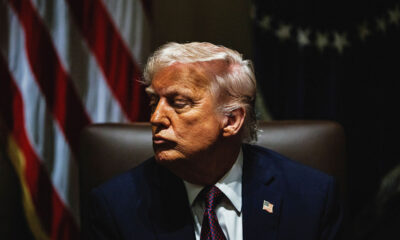Donald Trump’s inauguration promises to usher in an era of upheaval in global commerce, forcing governments around the world to scramble in preparation for a tariff onslaught even before he’s back in the White House.
Soon after calls to congratulate the president-elect on his Nov. 5 victory, officials began quietly looking for ways to appease him while simultaneously mapping out ways to retaliate if needed.
The threat to China is longstanding, meaning its leaders have had ample time to prepare defenses and retaliatory strategies. But this time around, Trump and the trade hawks he’s enlisted are broadening their scope in what threatens to be a more prolonged and unpredictable trade war than during his first presidency. not supported.
Mexico and Canada have borne much of the brunt of Trump’s trade threats since election day, prompting leaders from both American neighbors to publicly warn of retaliation. Others are making preparations behind the scenes — Vietnam’s officials have promised to buy more U.S. goods, the European Union has bolstered its ability to counter tariffs, while Indian officials aim to negotiate their way through the coming storm.
“Trump 2.0 trade policy seems to be much more radical compared to 1.0,” says Yeo Han-koo , senior fellow at the Peterson Institute for International Economics and former South Korean trade minister. “It’s like a prisoner’s dilemma — the best scenario for all these countries is to band together and then resist, but there’s a motivation for each country to race to get a better deal compared to your competitors.”
If implemented, Trump’s threats to increase levies on Chinese goods to 60% and to 20% for the rest of the world would transform the structure of global trade flows away from the U.S., according to Bloomberg Economics. Retaliation would exacerbate the shock.
Behind the scenes
In Mexico, President Claudia Sheinbaum warned of the hit to U.S. inflation in response to Trump’s 25% tariff threats. The country has been quietly rolling out a strategy to reduce reliance on China. Developed over the last few months, the government’s plan includes tapping major automakers about sourcing components elsewhere.
Law enforcement kicked off a country-wide “cleaning operation” with a raid on a Mexico City shopping complex filled with Chinese goods in November. The following week, Mexico announced its biggest-ever seizure of fentanyl pills, a drug Trump says is being smuggled into the U.S. from its southern neighbor.
Mexico is set to scale up such efforts, carrying out searches for goods that entered the country without proper taxation. To that end, Mexico slapped 19% tariffs on goods imported through courier companies, a move that analysts said targets major e-retailers Temu and Shein.
“If we coordinate on this, there won’t be any tariffs,” Sheinbaum said about working with the US in late November.
In Canada, outgoing Prime Minister Justin Trudeau flew to meet with Trump days after his 25% tariff threat. Following Trump’s suggestion that its northern neighbor become America’s 51st state, Trudeau shot back there’s not a “snowball’s chance in hell” of that happening.
How the country approaches Trump has been thrown in limbo with Trudeau’s resignation. Behind the scenes, officials are examining export taxes on major commodities it sends to the U.S. in a move that would drive up American prices.
When Trump enacted levies on $200 billion in imports from China in 2018-2019, Vietnam was one of the biggest beneficiaries as exports to the U.S. more than doubled. Up to 16% of the increase in 2021 alone was a result of rerouting of goods to avoid U.S. tariffs on China, according to a Harvard Business School white paper.
Now, Vietnam — which has the fourth-biggest trade surplus with the U.S. after China, Mexico and Canada — appears to be in Trump’s sights. His trade advisor Peter Navarro called out the country by name in Project 2025, a right-wing policy blueprint.
Vietnam’s leaders in recent months have made efforts to balance the relationship between China and the US. The country’s deputy minister of foreign affairs has vowed to buy more aircraft, liquefied natural gas and other products while Prime Minister Pham Minh Chinh has emphasized the need to “remove all remaining obstacles” with the U.S.
Similarly, South Korea and Taiwan are considering plans to boost energy imports from the US to avoid Trump’s ire.
Balancing act
Increased dependency on the U.S. as a source of demand makes economies such as Vietnam more exposed should Trump decide to apply a universal tariff on all imports, by undercutting the business case to build new factories. Apart from China, economies such as South Korea, Taiwan, Malaysia and Thailand would be more exposed considering their high trade orientation, economists at Morgan Stanley led by Chetan Ahya wrote in a November note.
South Korea was forced to revise down its growth outlook, partly as a result of the growing geopolitical tensions contributing to weaker demand for the country’s exports. A top national security adviser to Japanese Prime Minister Shigeru Ishiba said the country should be prepared for the U.S. following through on tariff threats, meeting with Trump’s team during a visit to the U.S. late last year.
Then there’s the blow from second-round consequences.
“If Trump’s tariffs lead to China’s exports redirecting to the rest of Asia — and they’re very competitive — it’s very difficult for countries to compete,” said Sonal Varma, chief economist for India and Asia-ex Japan at Nomura Singapore Ltd. “That is something a lot of governments are thinking about.”
Among those economies that are increasingly worried about unfair competition from China is the EU, which faces twin concerns of an influx of cheap Chinese goods — particularly electric vehicles — and a new wave of tariffs from the U.S. Officials there have already prepared a list of American goods it could target with tariffs in the event Trump follows through with his threats.
Since Trump’s first term, EU member states have agreed to a new set of trade powers that will allow the bloc to strike back at third countries that use economic restrictions for political retribution. The EU’s new anti-coercion instrument strengthens trade defenses and enables the commission to impose tariffs or other punitive measures in response to such politically motivated restrictions.
Officials in Brazil appear less concerned about any U.S. tariffs, believing the nation can ramp up sales to other markets including Asian countries in the case it’s targeted. Indian officials are also allaying apprehensions for now, betting Prime Minister Narendra Modi’s good relations with Trump during his first presidency will continue and they have room to lower import duties for U.S. goods as part of any forthcoming negotiations.
“Economies are just stuck between a rock and a hard place in many ways,” said Frederic Neumann, chief Asia economist at HSBC Holdings Plc in Hong Kong. “It’s a very, very difficult course to navigate to appease both US demands to decouple from China, but at the same time to remain economically engaged with China.”


 Personal Finance1 week ago
Personal Finance1 week ago
 Economics1 week ago
Economics1 week ago
 Blog Post6 days ago
Blog Post6 days ago
 Economics1 week ago
Economics1 week ago
 Economics1 week ago
Economics1 week ago
 Personal Finance1 week ago
Personal Finance1 week ago
 Economics5 days ago
Economics5 days ago
 Economics7 days ago
Economics7 days ago











